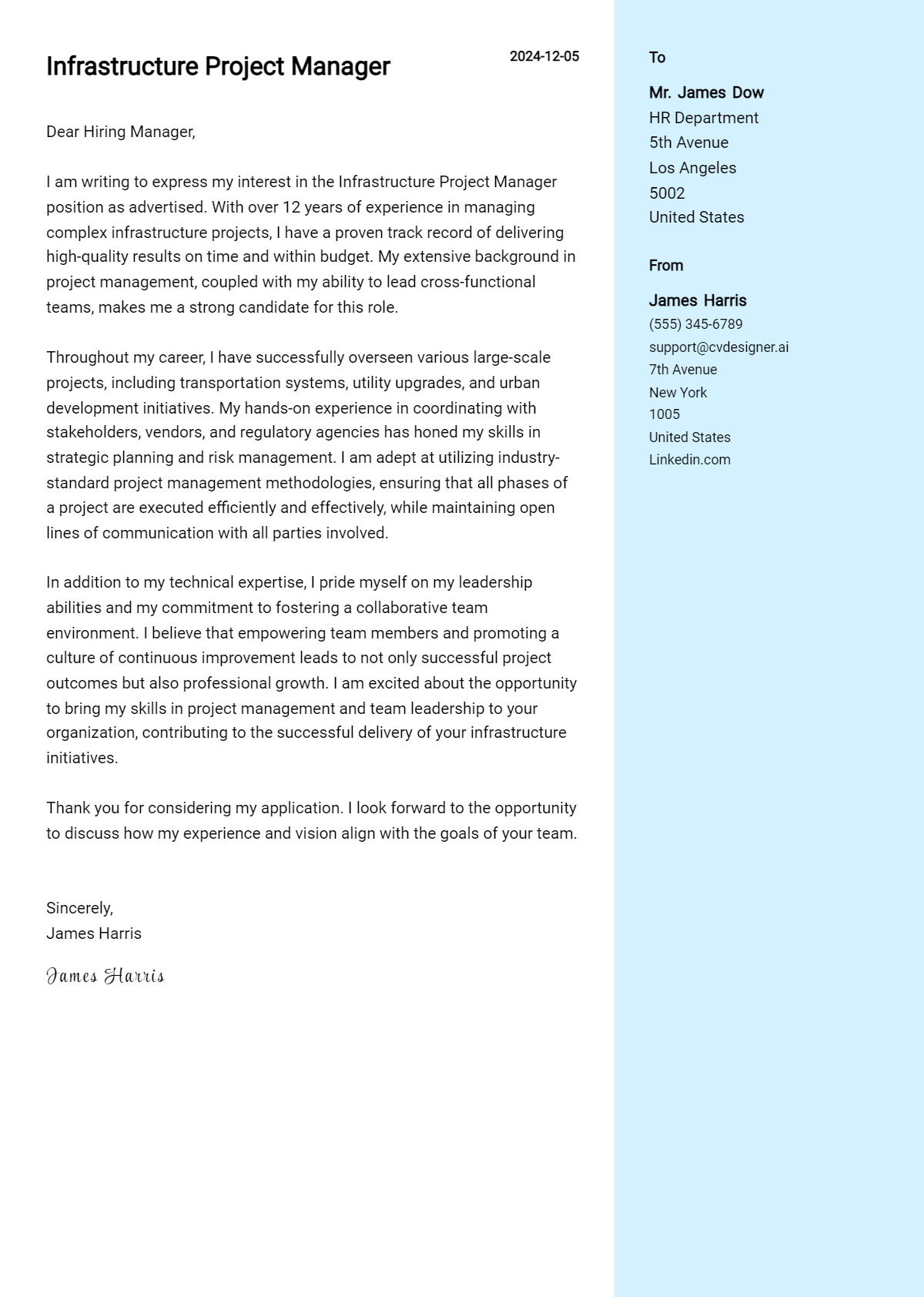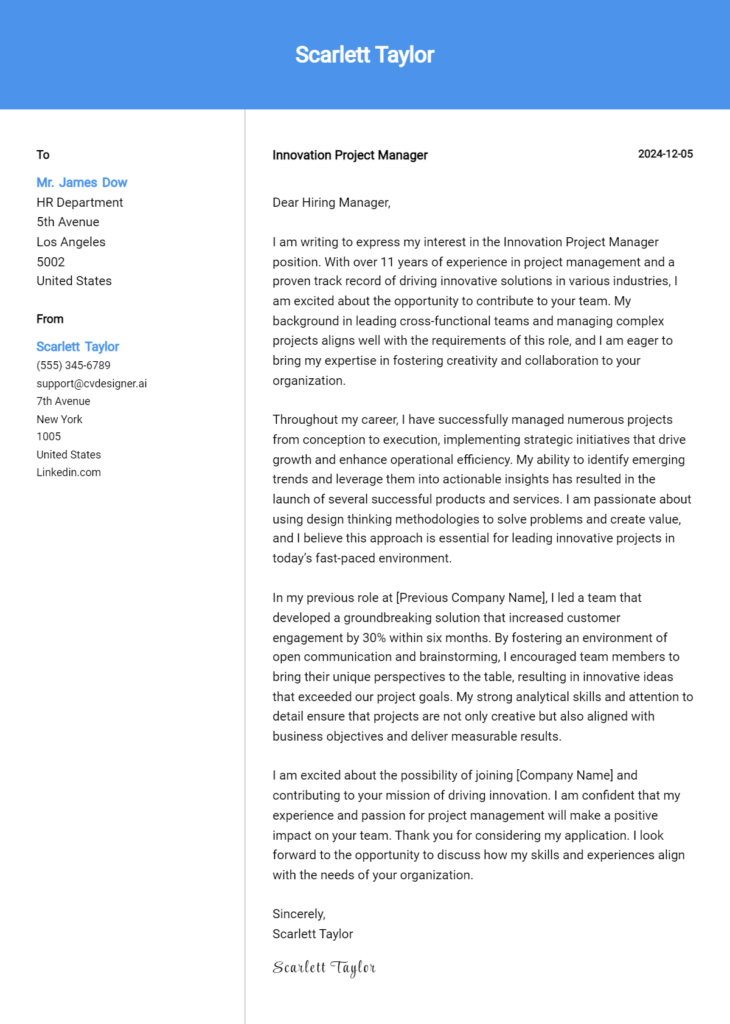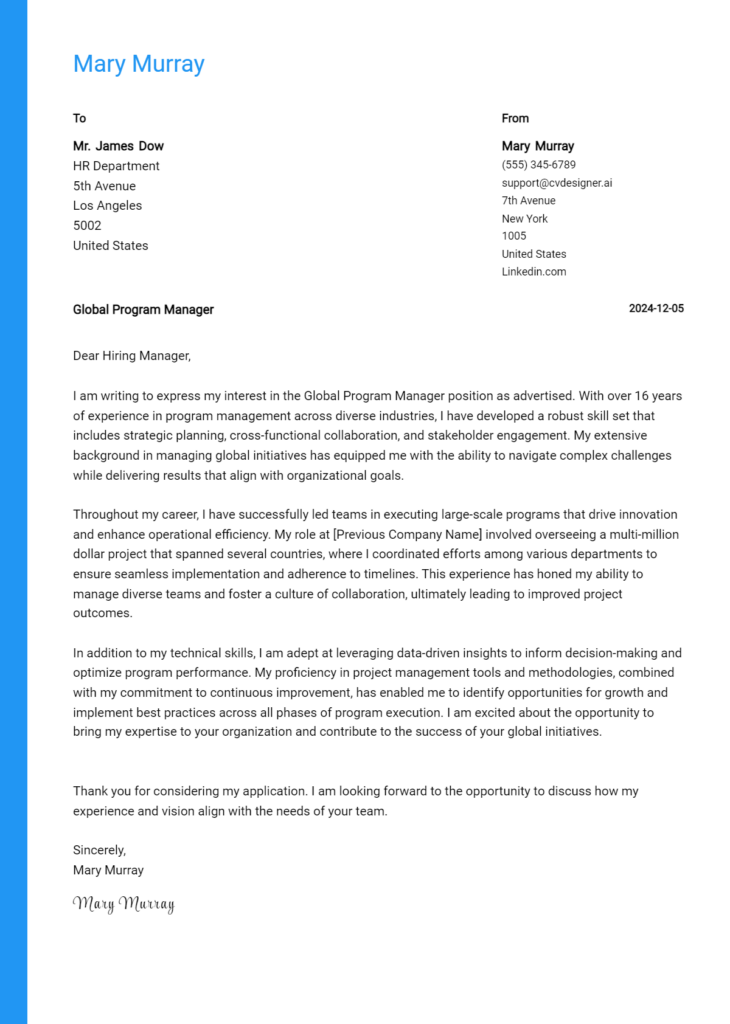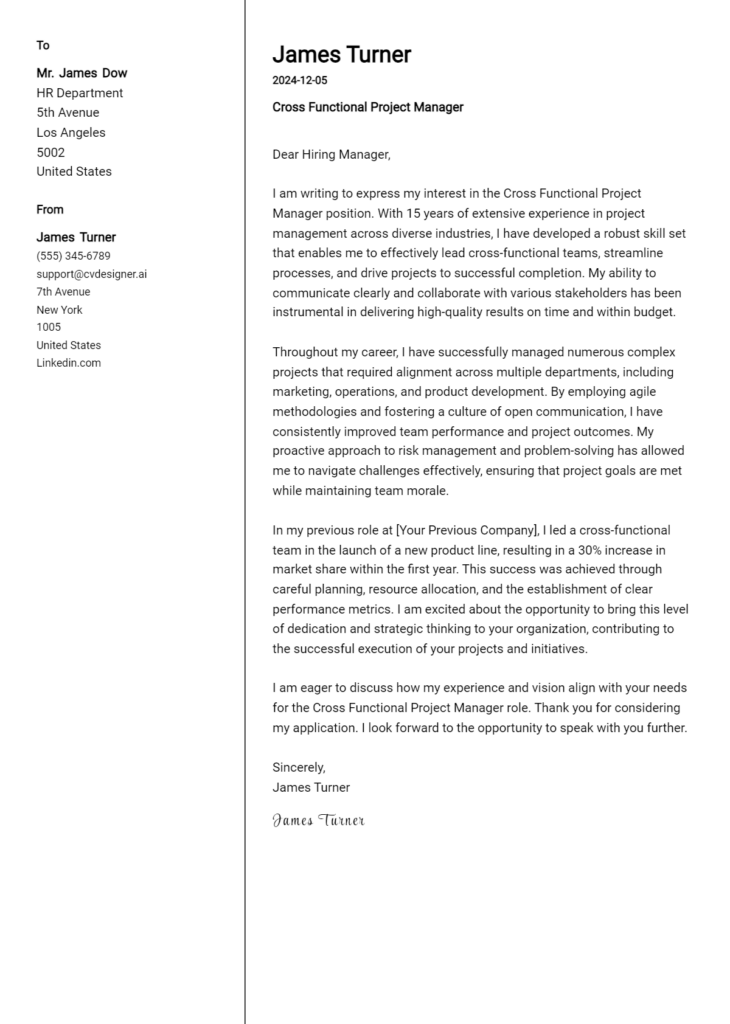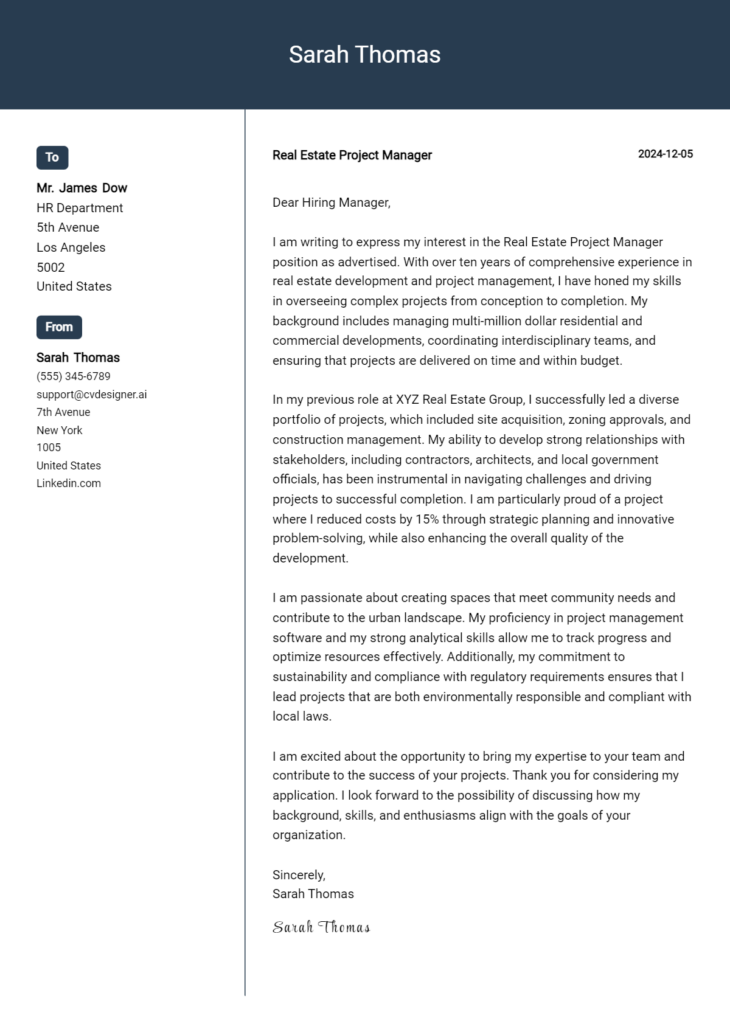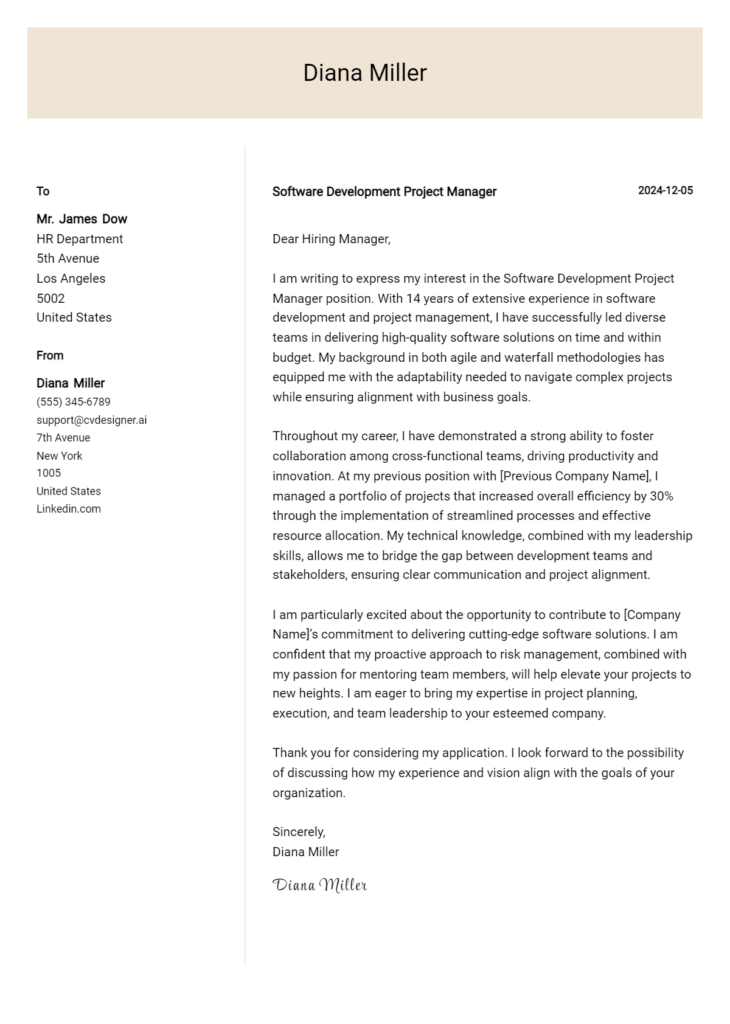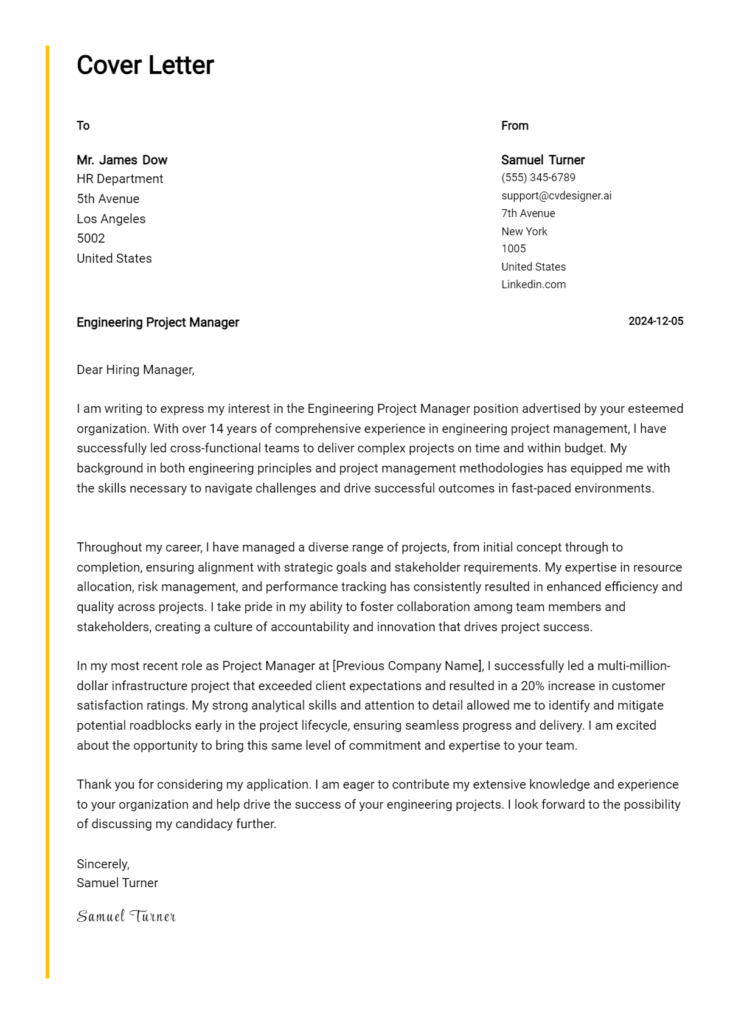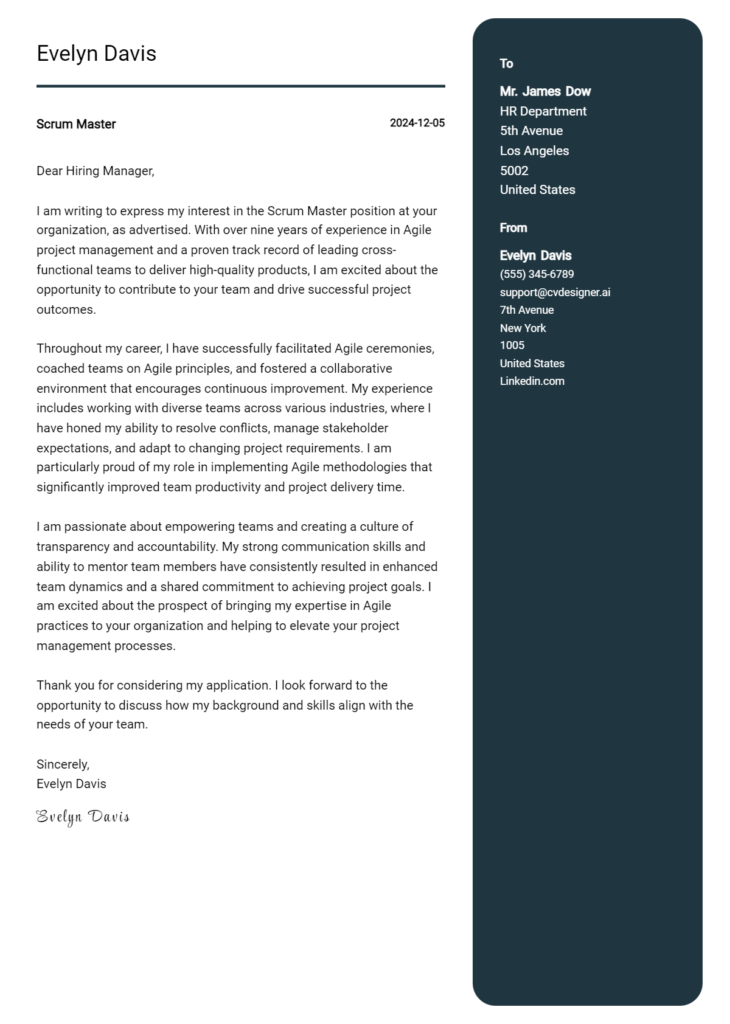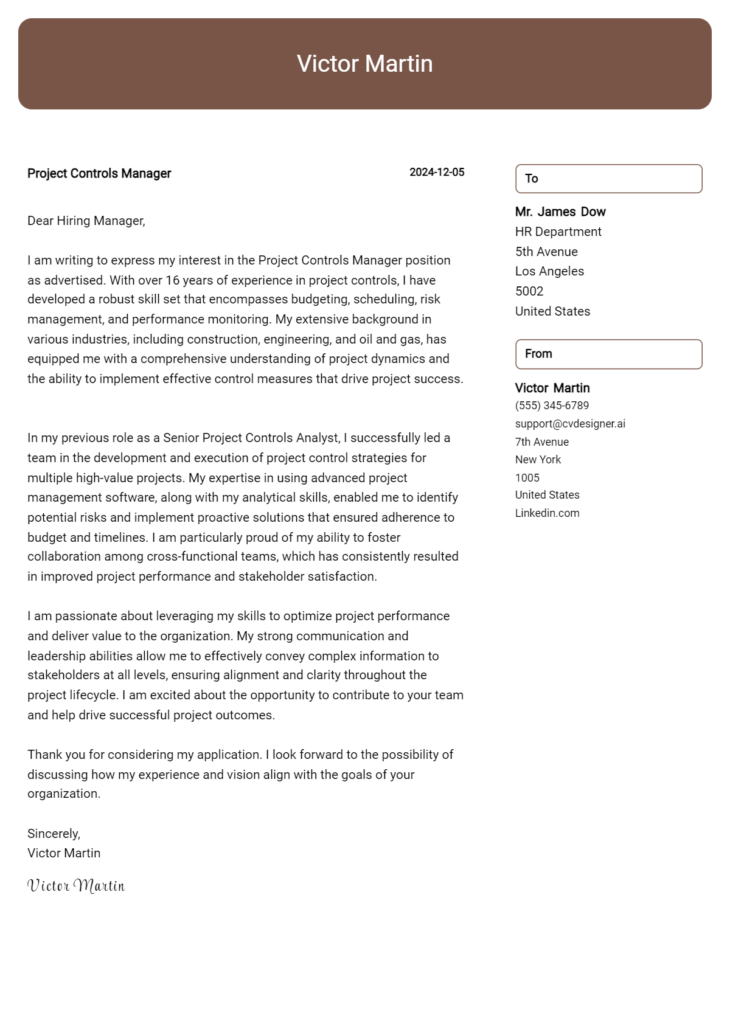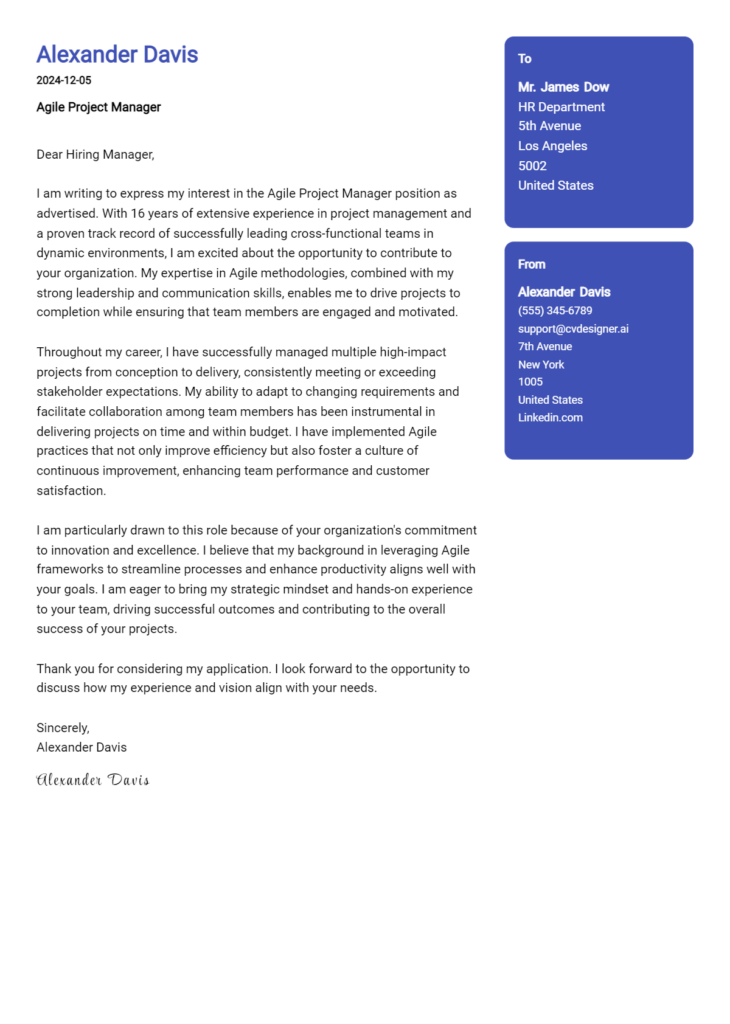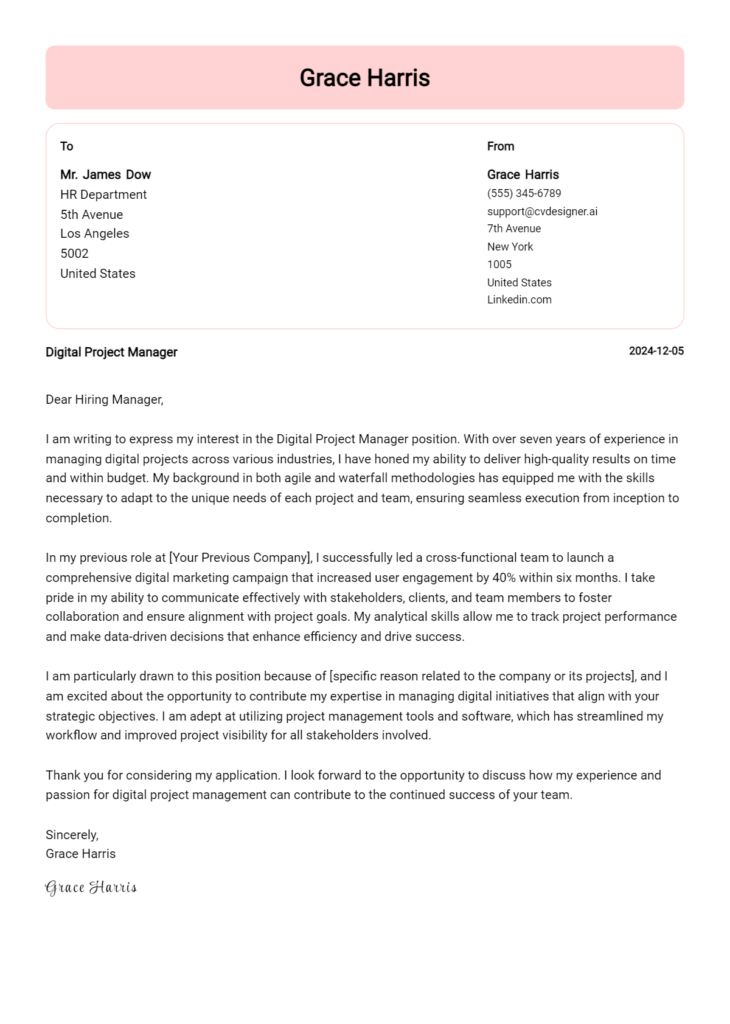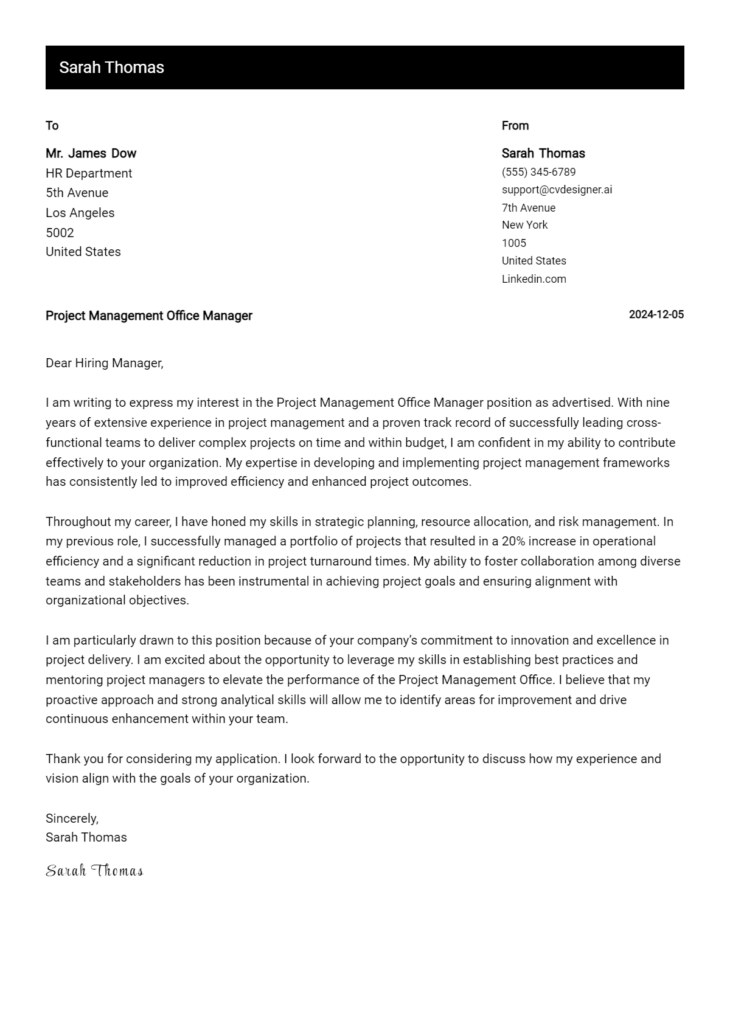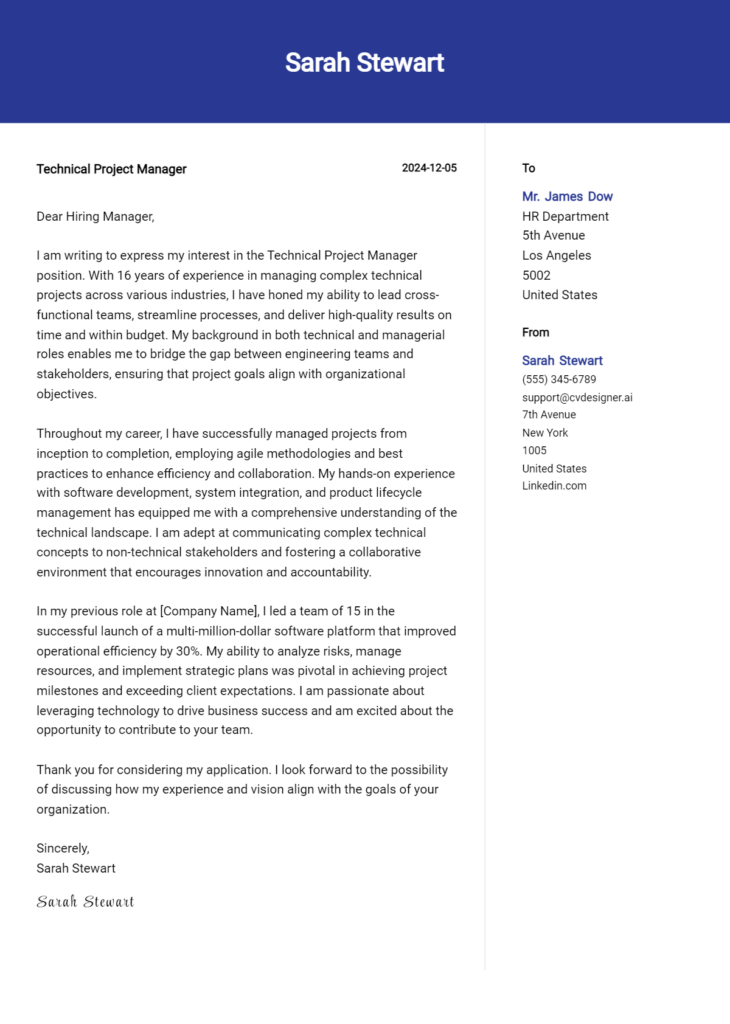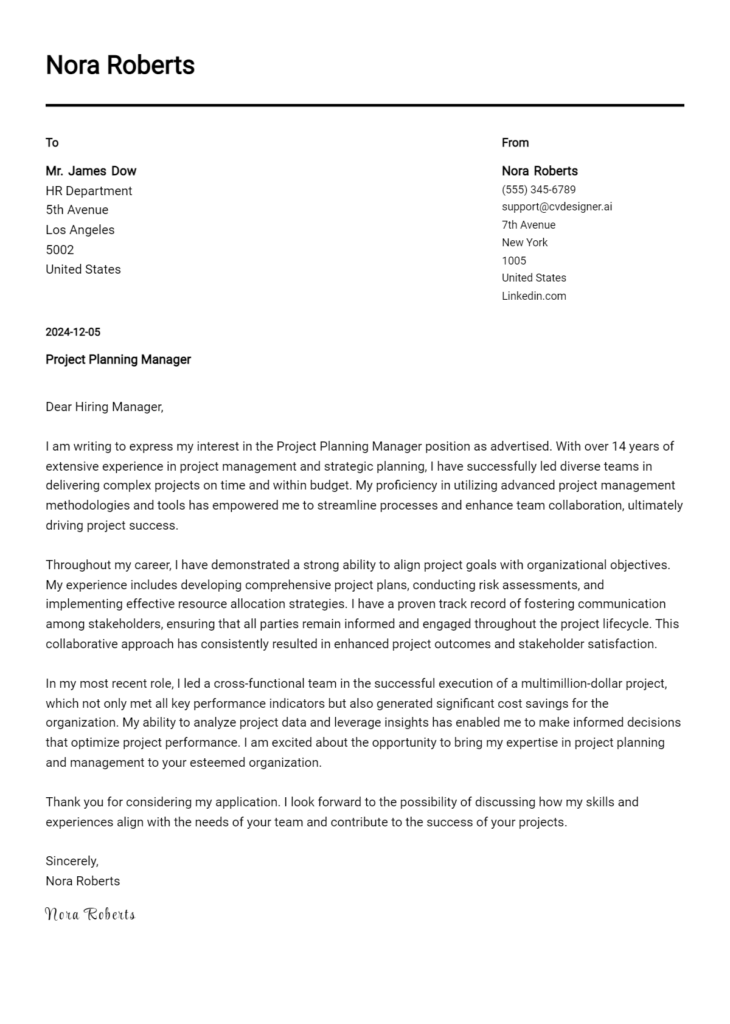Infrastructure Project Manager Cover Letter Examples
Explore additional Infrastructure Project Manager cover letter samples and guides and see what works for your level of experience or role.
How to Format an Infrastructure Project Manager Cover Letter
Crafting a compelling cover letter is essential for an Infrastructure Project Manager, as it serves as your first opportunity to make a lasting impression on potential employers. Proper formatting not only showcases your qualifications but also demonstrates your organizational skills and attention to detail—key attributes in managing complex infrastructure projects. A well-structured cover letter allows you to effectively communicate your expertise while capturing the hiring manager's interest, setting the stage for a successful application.
In this guide, we will outline how to structure your cover letter, providing insights and industry-specific examples to help you create a persuasive document.
We will focus on the essential components of a professional cover letter, including:
- Cover Letter Header
- Cover Letter Greeting
- Cover Letter Introduction
- Cover Letter Body
- Cover Letter Closing
Each section is crucial in emphasizing your qualifications and professionalism. Let’s break down each part and explore how to make your infrastructure project manager cover letter stand out.
Importance of the Cover Letter Header for an Infrastructure Project Manager
The header of a cover letter is crucial as it sets the tone for your application and provides essential information at a glance. For an Infrastructure Project Manager, clarity and professionalism in the header are vital to make a strong first impression. The header should include your contact information, the date, and the recipient's details, ensuring that the hiring manager can easily identify who you are and how to reach you. A well-formatted header reflects your organizational skills and attention to detail, which are critical qualities for a Project Manager.
Strong Example
John Doe 1234 Project Lane City, State, ZIP (123) 456-7890 johndoe@email.com October 1, 2023 Jane Smith Hiring Manager XYZ Corporation 5678 Business Rd. City, State, ZIP
Weak Example
johndoe@email.com XYZ Corporation City, State 10/01/23
The Importance of the Cover Letter Greeting
The greeting of your cover letter serves as the first impression you make on a potential employer and sets the tone for the rest of your application. A well-crafted greeting demonstrates professionalism and shows that you have taken the time to personalize your communication by addressing the hiring manager directly. This personal touch can help you stand out in a competitive job market, particularly for roles such as an Infrastructure Project Manager, where attention to detail and effective communication are paramount. To make the most of your greeting, avoid generic salutations like "To Whom It May Concern" and instead aim to research the recipient's name if possible. This not only reflects your initiative but also establishes an immediate connection with the reader.
Strong Greeting Example
Dear Ms. Johnson,
Weak Greeting Example
To Whom It May Concern,
The Importance of a Strong Cover Letter Introduction for an Infrastructure Project Manager
A well-crafted cover letter introduction is crucial for an Infrastructure Project Manager as it serves as the first impression to the hiring manager. This opening paragraph must be engaging enough to capture attention while succinctly expressing the candidate’s genuine interest in the role. Additionally, it should highlight key skills or relevant achievements that align with the job requirements, setting the tone for the rest of the letter. A strong introduction can differentiate a candidate from others, making it essential to strike the right balance between professionalism and enthusiasm.
Strong Example
Dear Hiring Manager, As a dedicated Infrastructure Project Manager with over 10 years of experience leading successful projects in both public and private sectors, I am excited to apply for the position at [Company Name]. My proven track record in delivering infrastructure solutions on time and within budget, combined with my strong communication and leadership skills, positions me uniquely to contribute to your team and drive impactful results.
Weak Example
To Whom It May Concern, I am writing to apply for the Infrastructure Project Manager position. I believe I have some relevant experience, and I hope you will consider my application. I have worked on a few projects in the past, but I am not sure if they will be impressive to you.
Cover Letter Body for Infrastructure Project Manager
The body of a cover letter for an Infrastructure Project Manager plays a crucial role in illustrating the candidate's qualifications and the unique value they bring to the organization. It should effectively showcase relevant skills and experiences, particularly by detailing specific projects or accomplishments that demonstrate the candidate's ability to manage complex infrastructure initiatives. By highlighting successful projects, such as the completion of a major transportation upgrade or the implementation of a new energy efficiency program, the candidate can provide tangible evidence of their expertise and results-driven approach. This section serves not just to list qualifications but to narrate a compelling story of past successes and the potential for future contributions.
Strong Example
In my previous role as an Infrastructure Project Manager at XYZ Corp, I successfully led a $5 million highway expansion project that improved traffic flow by 30% and reduced congestion-related delays. By implementing agile project management techniques, I was able to streamline communication between stakeholders, resulting in project completion two months ahead of schedule and under budget. Additionally, my leadership in a sustainability initiative reduced construction waste by 25%, showcasing my commitment to environmentally responsible project management. I am eager to bring my expertise in large-scale infrastructure projects to your team, ensuring efficient execution and alignment with your strategic goals.
Weak Example
I have worked as an Infrastructure Project Manager for several years. I have managed many projects and have some experience in the field. I think I would be a good fit for your company. I have completed projects on time and within budget. I also have some skills in project management tools. I hope to contribute to your company.
The Importance of the Cover Letter Closing for an Infrastructure Project Manager
The closing paragraph of a cover letter is crucial, especially for an Infrastructure Project Manager, as it serves to summarize your qualifications, reinforce your enthusiasm for the role, and encourage the hiring manager to take the next step—whether that’s reviewing your resume or scheduling an interview. A well-crafted closing can leave a lasting impression and motivate the reader to consider you as a top candidate. Conversely, a weak closing might miss the opportunity to highlight your fit for the position or fail to convey your eagerness to discuss your application further.
Strong Example
I am excited about the opportunity to bring my extensive experience in managing large-scale infrastructure projects to your esteemed organization. With a proven track record of delivering projects on time and within budget, I am confident in my ability to contribute effectively to your team. I would love the chance to discuss how my background, skills, and certifications align with the goals of your company. Thank you for considering my application, and I look forward to the possibility of discussing this exciting opportunity with you.
Weak Example
Thanks for reading my cover letter. I think I would be good at this job. Please look at my resume when you get a chance. I hope to hear from you.
These tips will help candidates craft an effective cover letter for an Infrastructure Project Manager position. A well-written cover letter is crucial for standing out in this competitive field, where showcasing technical skills, problem-solving abilities, knowledge of the Software Development Life Cycle (SDLC), teamwork, and a passion for continuous learning can make all the difference. Below are some detailed tips to help you articulate your qualifications and enthusiasm effectively.
Tips for Writing a Cover Letter for an Infrastructure Project Manager
Highlight Your Technical Skills: Begin your cover letter by emphasizing your technical proficiencies relevant to infrastructure management. Mention specific tools, technologies, and methodologies you have experience with, such as cloud computing, networking protocols, or project management software. This not only shows your qualifications but also demonstrates your readiness to tackle the technical aspects of the role.
Demonstrate Problem-Solving Abilities: Infrastructure projects often come with unique challenges. Use your cover letter to share examples of how you have successfully addressed complex issues in previous roles. Discuss specific situations where your analytical skills led to effective solutions, ensuring to quantify your impact where possible to illustrate your contributions clearly.
Showcase Your SDLC Knowledge: Understanding the Software Development Life Cycle is crucial for an Infrastructure Project Manager. Mention your familiarity with the different stages of SDLC and how you have applied this knowledge in past projects. This can include coordinating with development teams, ensuring compliance with best practices, or managing cross-functional teams during software implementations.
Emphasize Teamwork and Collaboration: Infrastructure projects often require collaboration across various departments. Highlight your experience working with diverse teams, including developers, engineers, and stakeholders. Provide examples of how you’ve fostered a collaborative environment, resolved conflicts, and ensured everyone is aligned with project goals. This will underscore your ability to lead and work well with others.
Convey a Passion for Continuous Learning: The field of infrastructure is constantly evolving, making it essential to stay updated with the latest trends and technologies. Share your commitment to professional development, such as certifications you’ve pursued, workshops you’ve attended, or industry events you’ve participated in. This will signal to potential employers that you are proactive and dedicated to growing your expertise.
By following these tips, you can create a compelling cover letter that effectively showcases your qualifications as an Infrastructure Project Manager. For more resources, consider checking out cover letter templates or using a cover letter builder to streamline your writing process.
Common Mistakes to Avoid in an Infrastructure Project Manager Cover Letter
Avoiding common mistakes in your cover letter is crucial for standing out in a competitive job market, especially for an Infrastructure Project Manager role. A well-crafted cover letter can showcase your qualifications and enthusiasm, while a poorly written one can undermine your chances of landing an interview. Here are some common pitfalls to watch out for:
Generic Content: Tailoring your cover letter to the specific job and company is essential. Avoid using a one-size-fits-all approach. Research the company and incorporate relevant details that align with their values and goals.
Neglecting Structure: A poorly structured cover letter can confuse the reader. Adhere to a professional cover letter format that includes a clear introduction, body paragraphs highlighting your skills, and a strong closing statement.
Focusing on Responsibilities Rather than Achievements: Instead of listing job duties, emphasize your achievements and how they relate to the Infrastructure Project Manager role. Use quantifiable data to demonstrate your impact.
Ignoring the Job Description: Failing to address the specific qualifications and skills mentioned in the job description can give the impression that you are not a good fit. Make sure to align your experiences with the requirements of the position.
Overly Formal or Casual Tone: Striking the right tone is important. A cover letter that is too formal can come across as stiff, while an overly casual tone may seem unprofessional. Aim for a balance that reflects your personality while maintaining professionalism.
Typos and Grammatical Errors: These mistakes can undermine your professionalism. Always proofread your cover letter multiple times and consider using tools to check for errors.
Failing to Include a Call to Action: Conclude your cover letter with a strong call to action, expressing your eagerness to discuss your application further. This encourages the employer to reach out to you.
For additional insights and inspiration, check out our cover letter examples to see effective writing in action. By steering clear of these common mistakes, you can create a compelling cover letter that enhances your candidacy for an Infrastructure Project Manager position.
Cover Letter FAQs for Infrastructure Project Manager
What key skills should I highlight in my cover letter for an Infrastructure Project Manager position?
In your cover letter, focus on skills that are essential for managing infrastructure projects effectively. Highlight your project management expertise, including proficiency in methodologies like Agile or Waterfall. Emphasize your leadership and communication skills, as coordinating teams and stakeholders is crucial. Additionally, showcase your technical knowledge in infrastructure, such as experience with construction, IT networks, or civil engineering. Don't forget to mention your problem-solving abilities, as challenges often arise in large projects. Tailor your skills to align with the specific requirements listed in the job description, providing examples of how you've successfully applied them in previous roles.
How do I demonstrate my project management experience in my cover letter?
To effectively demonstrate your project management experience, use quantifiable achievements and specific examples from your past roles. Start by describing a significant infrastructure project you managed, detailing your role, the scope, and the outcomes. Include metrics such as budget size, timelines, and team size to give context. Highlight any challenges you faced and how you overcame them, showcasing your adaptability and strategic thinking. Also, mention any relevant certifications you hold, such as PMP or PRINCE2, as these add credibility to your experience. By providing concrete examples, you help hiring managers visualize your capabilities and the value you could bring to their organization.
Should I include technical certifications in my cover letter?
Yes, including technical certifications in your cover letter is highly beneficial, especially for an Infrastructure Project Manager role. Certifications such as PMP, PRINCE2, or specific engineering qualifications demonstrate your commitment to professional development and your understanding of project management principles. Mention these certifications early in your cover letter to catch the reader's attention. Additionally, explain how these qualifications have equipped you with the skills necessary to manage complex infrastructure projects effectively. This not only showcases your expertise but also differentiates you from other candidates who may not have similar credentials.
How can I tailor my cover letter to a specific job application?
To tailor your cover letter for a specific job application, start by thoroughly reading the job description to identify key responsibilities and required skills. Incorporate keywords and phrases from the job listing into your cover letter. Next, reflect on your relevant experiences and align them with the specific needs of the position. For example, if the job emphasizes stakeholder management, discuss a time when you successfully engaged stakeholders in a project. Additionally, mention the company’s values or mission and express how your professional goals align with them. This personalized approach demonstrates your genuine interest in the position and shows that you’ve done your homework about the company and its projects.
Build your Cover Letter in minutes
Use an AI-powered cover letter builder and have your letter done in 5 minutes. Just select your template and our software will guide you through the process.

